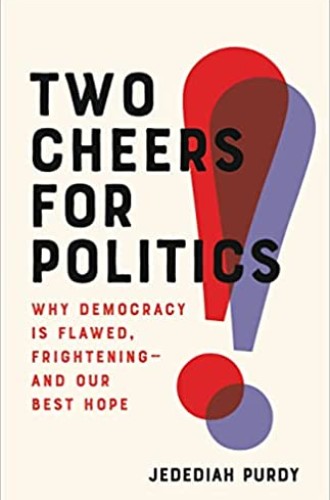Jedediah Purdy’s democratic vision
This formidable yet accessible book should be homework for every thoughtful American.
Jedediah Purdy, who teaches law at Duke University, is a new voice to me. This is a shame, because I would have liked his wise counsel during the political crisis that we have faced in this country over the last several years.
Purdy is a true democrat. He believes in political and economic democracy against all competitors. He has arrived at this conviction through close study of the history of Western political thought and practice, which he dips into and out of here with fluency and originality of vision. Rarely have I seen figures like Thomas Hobbes, Adam Smith, Jean-Jacques Rousseau, Alexis de Tocqueville, W. E. B. Du Bois, and Friedrich Hayek discussed with so much interest and nuance.
One of the most interesting aspects of Purdy’s historical account is his frank documentation of the antidemocratic dimensions of the American Constitution—most notably the Electoral College and the Senate, but also how gravely difficult the founders intentionally made it to amend the Constitution. For Purdy, the Constitution itself is one of the greatest obstacles to democracy in America. This is quite a claim.
Read our latest issue or browse back issues.
Purdy contends that James Madison and Alexis de Tocqueville—those canonical describers and defenders of the new American democratic republic—quite openly supported efforts to limit popular sovereignty. They feared what the people would truly do if empowered to tinker with what the elites had developed. Purdy says that you do not have a democracy unless the lower and middle classes genuinely enjoy full democratic participation and the power to set the direction of their country. This, he says, is what elites have been trying to prevent for most of American history.
Purdy demonstrates a sensitive grasp of the ways that democracy is indeed, as his subtitle claims, frightening and flawed. He says that the central problem of politics is “finding terms of alliance for people who need one another and are in one another’s way.” In a democracy, these terms are set through majority rule. This means that at any given time, a minority of us are at risk of losing to a majority, who then have the power to rule the whole community in ways that the minority may very much dislike. It is difficult to accept having our perceived interests harmed by majority vote—at least, when our side loses.
But there are problems with every other kind of human governance too. The major alternative, says Purdy, is the concentration of power in the hands of elites, who simply dictate terms to everyone beneath them. A significant feature of Purdy’s work is his strong defense of the democratization of economic life. He contends that concentrated economic power is a major antidemocratic force in American life (and elsewhere). He would rather be ruled by a vote of his neighbors than by the tender mercies of the barons of unfettered laissez-faire capitalism. He also demonstrates a genuine populist streak in relation to liberal meritocrats who, in his view, seem to feel entitled to rule on the basis of their intellectual and technical superiority.
One aspect of Purdy’s diagnosis of our cultural divisions is his claim that the right tends to embrace elite economic power, while the left embraces elite cultural, intellectual, and media power—and a whole lot of people find that neither serves their interests well at all. This helps to explain the rise of a faux-populist grifter like Donald Trump, who especially in his 2016 campaign challenged both groups in the name of the people’s interests (which, of course, he did little to address). Purdy expresses concern about the right-wing grift and nihilism so amply demonstrated in Trumpworld, but also about the highly visible left-wing despair that is with us today. He considers both to be significant threats to American democracy.
He also helps us understand how we got here. Purdy offers a sparkling retrospective analysis of the wrong turns made in American politics since the end of the Cold War. Foremost was the complacent “end of history” idea that liberal democratic global capitalism had prevailed, the world was clearly safe for democracy, and all that was really needed was “managerial competence” in relation to “market-making governance.” From George H. W. Bush through Obama, with plenty of help from across the pond, this was the government’s ethos.
Another fascinating part of the book is Purdy’s discussion of the Obama campaign and presidency. His description of the dreamy aspirations that he and so many of us found in Obama—of the world we imagined might be coming into being, only to be so cruelly crushed—captures my experience exactly.
Purdy’s critique of the Obama ethos is daring. He claims that it was a time when “words, words, words” aiming at social consensus through a long national conversation ended up as a kind of substitute for the hard work of democratic power politics aimed at building a new majority for constructive policy change. He might have emphasized a bit more strongly how much Obama’s foes hated him and wanted to stop him from accomplishing anything. And those of us who have benefited from Obamacare can at least name one life-changing policy that succeeded.
Purdy concludes with some fascinating proposals. He wants a constitutional convention in every generation, so that the Constitution belongs to all of us and is not frozen in time or dominated by lawyers—especially the ultimate, tiny, undemocratic elite that rules from the Supreme Court. He wants to broaden the franchise to all who live in this country, to democratize the economy, and to encourage a “patriotism of responsibility.” And he wants to see significant constitutional changes—including with respect to campaign finance, guns, the Electoral College, and the Senate.
This formidable yet accessible book should be homework for every thoughtful American. It is also clearly time, for many of us, to study the entire body of work Purdy has produced over the last two decades. He has emerged as a significant public intellectual.






